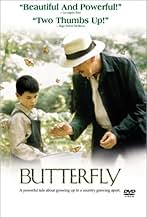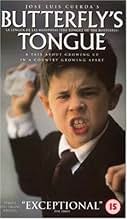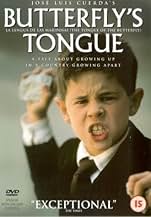CALIFICACIÓN DE IMDb
7.6/10
10 k
TU CALIFICACIÓN
España, 1936. Moncho empieza su primer año de colegio al tiempo que la República es atacada por los rebeldes fascistas y su profesor tomado como enemigo del fascismo.España, 1936. Moncho empieza su primer año de colegio al tiempo que la República es atacada por los rebeldes fascistas y su profesor tomado como enemigo del fascismo.España, 1936. Moncho empieza su primer año de colegio al tiempo que la República es atacada por los rebeldes fascistas y su profesor tomado como enemigo del fascismo.
- Dirección
- Guionistas
- Elenco
- Premios
- 6 premios ganados y 19 nominaciones en total
Elena Bagutta
- Carmiña
- (as Elena Fernández)
Roberto Vidal Bolaño
- Boal
- (as Roberto Vidal)
Antonio Lagares
- Alcalde
- (as Tucho Lagares)
- Dirección
- Guionistas
- Todo el elenco y el equipo
- Producción, taquilla y más en IMDbPro
Opiniones destacadas
In this film, we see Spain lurching toward the brink of the Spanish Civil War through the huge uncomprehending eyes of the child Moncho. The metaphor for "Butterfly" has many complex applications in this film but for me the most profound of them was the moment that Moncho's saintly teacher captures a butterfly in a net, tenderly observes it and then sets it free. If only the future of Spain had been in such sensitive hands. As the film progresses through its beautifully photographed scenes of ordinary life, the reality of the evils of Fascism and the hope of the Republicans begin to chasm the serenity of the land.
The film is not about war, it is rather, about how much personal honor people will trade for an idea of security for themselves and their families. In a way, it parallels the dilemma in the scene in Eisenstein's STRIKE in which a woman with starving children is thrown a coin by one of the factory bosses. Wonderfully executed performances in a profoundly moving film. -Rowena Silver
The film is not about war, it is rather, about how much personal honor people will trade for an idea of security for themselves and their families. In a way, it parallels the dilemma in the scene in Eisenstein's STRIKE in which a woman with starving children is thrown a coin by one of the factory bosses. Wonderfully executed performances in a profoundly moving film. -Rowena Silver
This one was one of the excellent movies I have seen for the last couple of years. It takes you back to 1936, Spanish War in Galicia. Telling the truth I did not know well what happened there exactly . But this movie showed how the war influenced those people who lived in a small town to live their small lives. By the time they showed the ending scene my heart ached. I truly wished that someone could have been here with me to enjoy the afterglow this time. It has not happened to me lately. Plus their way to take this film was exquisite. Every single scene was beautiful and sentimental as if you turn around the post cards stand at the souvenir shop.
This was a film that really tugged at the heart strings. I really enjoyed the building of characters and the way the lives of the village were portrayed. It was a difficult time politically, yet the simplicity of daily life and family in Galicia was the over-riding story here. The acting is second to none and Manuel Lozano was unbelievably fantastic! I mean these ridiculous "affected" children they get for American movies (i.e. the "Pepsi" girl) are so unbelievable and fake. Manuel is so realistic as Moncho. So are the other actors.
I don't necessarily agree with the way that Cuerda rushed the ending, but I certainly wouldn't want to take away any time in portraying the lives of everyone involved. Maybe he should have made it a little longer as not to rush the ending. Although I will say that one of my favorite things about foreign films is that they are so NOT "Hollywood" that you never really know what to expect. Unlike the trite, unbelievable, over-acted, high budget American films and their overpaid actors which usually just leave a bad taste when I exit from the theatre.
This is an historical piece that absolutely shames "the Patriot". It's so nice to see that a movie doesn't have to change history to show us the past and entertain us at the same time!
I don't necessarily agree with the way that Cuerda rushed the ending, but I certainly wouldn't want to take away any time in portraying the lives of everyone involved. Maybe he should have made it a little longer as not to rush the ending. Although I will say that one of my favorite things about foreign films is that they are so NOT "Hollywood" that you never really know what to expect. Unlike the trite, unbelievable, over-acted, high budget American films and their overpaid actors which usually just leave a bad taste when I exit from the theatre.
This is an historical piece that absolutely shames "the Patriot". It's so nice to see that a movie doesn't have to change history to show us the past and entertain us at the same time!
It's a beautiful (and too rare) thing to witness a child actor who can avoid the saccharine cutesiness so common to mainstream American child actors. In this film full of children there are, happily, no cloying, exaggerated "cute kid" moments.
The real beauty of La lengua de las mariposas is what's unspoken -- the truths that remain between the lines. The film's political theme is never heavy-handed, and its vivid and fascinating depiction of a turbulent moment in Spanish history has inspired in me a desire to learn more. Without spoiling the ending (which I read as fairly subversive, at least to an American audience), I must say I wasn't entirely surprised at what happened. It brought a tear to my eye and it's still making me think, three days later.
Those who liked this film should also see La Vita e Bella (Life Is Beautiful) and La notte di San Lorenzo (Night Of Shooting Stars), which are similar and may appeal equally, if not more.
The real beauty of La lengua de las mariposas is what's unspoken -- the truths that remain between the lines. The film's political theme is never heavy-handed, and its vivid and fascinating depiction of a turbulent moment in Spanish history has inspired in me a desire to learn more. Without spoiling the ending (which I read as fairly subversive, at least to an American audience), I must say I wasn't entirely surprised at what happened. It brought a tear to my eye and it's still making me think, three days later.
Those who liked this film should also see La Vita e Bella (Life Is Beautiful) and La notte di San Lorenzo (Night Of Shooting Stars), which are similar and may appeal equally, if not more.
A European import teaches us how simple and beautiful film can be. `Butterfly' or `Butterfly Tongues' (in some US markets) tells the delightful story of Moncho, a young boy's coming of age as his world opens up through the eyes of his beloved teacher, Don Gregorio. As the teacher brings the boy into the fascinating world of butterflies, the boy begins to emerge from his cocoon. But looming on the horizon is the surgence of a fascist regime that threatens to unravel their innocent world.
In the summer of 1936, which is when the films takes place, the whole of Spain was intertwined in the struggle between the Mussolini inspired Nationalist Party and the Republicans. But as the rest of Europe was being over run by a couple different fascist regimes, Spain was trying desperately to prevent that outcome. The film `Butterfly' brings in these elements and lets these two main characters deal with the impending doom and the heart-breaking aftermath. The film also beautifully depicts these simple folks who are desperately trying to find their way in the world. From one side you have the teacher who is just trying to bring peace to his students and their world. And on the other a young boy trying to understand the gigantic world around him. The teachings of the butterflies are a metaphor for the change coming in Spain and in both of their lives. This metaphor rings cleverly through each character in the film which does beg the question did the teacher know about the coming conflict and was trying to say something subtly. After watching this film, I learned the character of Don Gregorio was played by a legendary Spanish actor named Fernando Fernan Gomez. I could see even before I knew who he was that this man is amazing. I haven't seen this kind of subtle grace since Sir John Gielgud. I wish I had a teacher like him in my life. (4 of 5) So Says the Soothsayer. (Now Playing)
In the summer of 1936, which is when the films takes place, the whole of Spain was intertwined in the struggle between the Mussolini inspired Nationalist Party and the Republicans. But as the rest of Europe was being over run by a couple different fascist regimes, Spain was trying desperately to prevent that outcome. The film `Butterfly' brings in these elements and lets these two main characters deal with the impending doom and the heart-breaking aftermath. The film also beautifully depicts these simple folks who are desperately trying to find their way in the world. From one side you have the teacher who is just trying to bring peace to his students and their world. And on the other a young boy trying to understand the gigantic world around him. The teachings of the butterflies are a metaphor for the change coming in Spain and in both of their lives. This metaphor rings cleverly through each character in the film which does beg the question did the teacher know about the coming conflict and was trying to say something subtly. After watching this film, I learned the character of Don Gregorio was played by a legendary Spanish actor named Fernando Fernan Gomez. I could see even before I knew who he was that this man is amazing. I haven't seen this kind of subtle grace since Sir John Gielgud. I wish I had a teacher like him in my life. (4 of 5) So Says the Soothsayer. (Now Playing)
¿Sabías que…?
- TriviaOn one of their walks home (at 0:38:41), Moncho asks Andrés whether he knows what a tilonorrinco is and proceeds to talk about an Australian bird. In Spanish tilonorrinco is what in English is called the satin bowerbird (Ptilonorhynchus violaceus), a bowerbird endemic to eastern Australia.
- Bandas sonorasEn er mundo
Written by Juan Quintero (as Juan Quintero Muñoz) and Jesús Fernández Lorenzo
Selecciones populares
Inicia sesión para calificar y agrega a la lista de videos para obtener recomendaciones personalizadas
- How long is Butterfly?Con tecnología de Alexa
Detalles
- Fecha de lanzamiento
- País de origen
- Sitio oficial
- Idiomas
- También se conoce como
- Butterfly
- Locaciones de filmación
- Productoras
- Ver más créditos de la compañía en IMDbPro
Taquilla
- Total en EE. UU. y Canadá
- USD 2,092,682
- Total a nivel mundial
- USD 7,738,129
- Tiempo de ejecución1 hora 36 minutos
- Color
- Mezcla de sonido
- Relación de aspecto
- 2.35 : 1
Contribuir a esta página
Sugiere una edición o agrega el contenido que falta




























